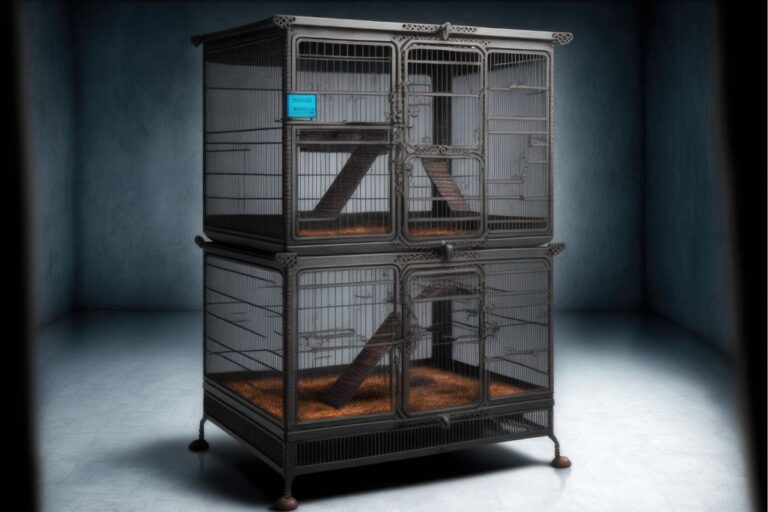Lethargic Ferret. What Are The Signs?

Ferrets are friendly, adorable and have a relatively long lifespan. When well taken care of, a ferret can live up to 10 years. Generally, a ferret will lead a healthy life for 7-10 years. However, it does not mean that ferrets do not fall ill. If your fuzzy friend has become lethargic over time, it could mean that he is sick.
In this article, I am going to outline some of the reasons why your ferret is lethargic. Most ferret illnesses will be characterized by lethargy. Therefore, there could be various explanations for why your ferret has appeared lethargic.
Why is my ferret lethargic?
When you finally get a pet, it is your responsibility to ensure that they lead a healthy life. Your ferret is no different. Fortunately, you will rarely have to deal with health issues when you take care of your ferret.
Ferrets are prone to various illnesses including:
- Diarrhea
- Heatstroke
- Insulinoma
- Lymphoma
- Dilated cardiomyopathy
- Gastrointestinal blockage
Unfortunately, almost all of these illnesses have lethargy as a leading symptom. Therefore, you must observe your ferret notice other symptoms. You must also take your ferret to the vet if you are concerned that your ferret is sick.
Insulinoma
Insulinoma is common and unfortunately a serious condition in ferrets. It is characterized by the growth of a tumor in the pancreas. These malignant tumors will produce too much insulin. As a result, your ferret might suffer low blood sugar.
When a ferret has insulinoma, he will show symptoms such as lethargy and loss of weight. Also, your ferret might experience seizures and decreased appetite. You will need to take him to your vet for the necessary blood sugar tests.
The symptoms of insulinoma may not show until in later stages. Therefore, you must be keen when you observe your ferret experiencing lethargy. And when these symptoms finally show, they will be gradual and thus the need to consult your vet as soon as possible.
Upon diagnosis, your vet will recommend the best treatment method depending on the test results. Your ferret might need surgery and thereafter medication to manage the condition.
Note that insulinoma can be quite fatal if left untreated. And it is common in older ferrets even though younger ones can also develop insulinoma.
Heatstroke
Ferrets can handle the cold but can barely survive in high temperatures. A ferret needs to live in temperatures not lower than 60 degrees Fahrenheit. However, due to extreme temperatures, especially during summer, temperatures can get quite high.
You should keep your ferret in a temperature-controlled room. Should it get past 80 degrees, then your ferret will struggle. Ferrets cannot cool their bodies unlike humans and other pets. Well, they do not sweat.
When it gets too hot, your ferret will experience trouble breathing. This is the first stage of heat stress. Your ferret might also lie on the floor of his cage, panting and running out of his breath. If it is hotter than 90 degrees, your ferret will suffer a fatal heatstroke.
Provide air conditioning during summer, and also enough water to keep your ferret hydrates. As I have always advised ferret owners, keep the cage away from direct sunlight.
First aid for heatstroke
Should you come home to find your ferret in heatstroke, you need to act first. Luckily, with skillful first aid measures, you will bring his body temperatures down. As I have mentioned above, symptoms of a heat stroke include an open mouth, lethargy and red paws.
Concentrate on lowering your ferret’s body temperatures when he is in a heat stroke. However, you should not do it abruptly as it could get to a dangerous level. For instance, you cannot dip him in ice-cold water immediately.
Rather, it is safer to do it gradually. Concentrate on cooling his footpads, groin, and his tail area. Well, you can dip a cloth or towel in cold water and wrap him with it.
Alternatively, you can use the drip method to cool your ferret down. Using a syringe, drip some water in his mouth. You must ensure that he can swallow the water. If he is unconscious, do not pour any liquids in his mouth.
Prolonged diarrhea
Well, diarrhea is one of the causes of lethargy. I mean, if your ferret has prolonged diarrhea, he will appear lethargic and sickly. Diarrhea is also a symptom of a secondary infection. Therefore, monitor him closely to identify the cause of diarrhea.
Well, it can be pretty hard to tell the cause of loose stool in ferrets. It could be an indication of a bacterial or viral infection. Sometimes it could be that your ferret has a parasitic infection. You will need to take him to the vet to determine what he is ailing from.
Your vet will determine the cause of diarrhea in your ferret as well as propose a cure. However, it is also important to identify the other symptoms accompanying diarrhea.
Gastrointestinal obstruction
This is fairly common in ferrets. They tend to love chewing and sometimes swallowing non-food items. In the end, these items will block his intestines, making it impossible to digest food. If you are not careful, you might not notice gastrointestinal obstruction at first.
Your ferret will refuse to eat and might experience stringy diarrhea. Well, sometimes it could be that he has swallowed so many hairballs they are blocking his intestinal tract.
Because of the lack of appetite, your ferret could have severe weight loss for the next couple of days. Some ferrets will try to eat and end up vomiting. They simply cannot keep anything down. Severe weight loss is likely to cause lethargy.
You should take your ferret to your vet for a check-up. If he has anything blocking his digestive tract, your vet might recommend endoplasmic removal or surgery.
Dilated cardiomyopathy
Ferrets can also suffer from heart disease. Even though there is no known cause, dilated cardiomyopathy might be as a result of his diet. It is similar to heart failure in humans.
While the commercial ferret food is safe, it contains Taurine, an ingredient known to cause heart disease. Well, your ferret will exhibit symptoms such as coughing, lethargy, difficulty breathing and your ferret could sleep for more hours than usual.
Now, cardiomyopathy in ferrets is a serious condition. If you observe some of these symptoms, you should consult your vet. Your vet will recommend the best medications to manage your ferret and he can enjoy a normal life.
However, if left untreated, your heart disease can be quite fatal.
Lymphoma
When speaking about common illnesses in ferrets, we cannot fail to mention lymphoma. This is the enlargement of the lymph nodes forming tender masses. Well, in most cases, these masses are malignant.
A ferret with lymphoma will have symptoms such as lethargy, reduced activity, and visibly swollen masses. Besides, your ferret will have a reduced appetite and might have blood in his poop.
Unfortunately, you might not observe any of these symptoms until is it too late. Well, do not ignore swollen lumps on your ferret’s skin. You should always take your ferret to the vet for a check-up.
Lymphoma is common in older ferrets, 4-6 years. However, it does not exempt younger ferrets from suffering the same.
Trauma and internal bleeding
Ferrets are playful pets. They love to run, jump and climb to higher surfaces during playtime. However, if your ferret has had a recent accident, he could be suffering from an internal injury. It is why I always advise ferret owners to conduct physical exams after a while.
Internal bleeding or trauma could lead to lethargy and reduced activity. Well, if you have two ferrets, they could have gotten into a fight and injured each other. They love to playfully fight with each other and occasionally end up scratching each other.
If your ferrets have been in a fight, pick each one and examine her well. Check for open wounds or lumps on your ferret’s body. If you are concerned about this, I suggest you check it out with your vet.
Conclusion
Lethargy is a common symptom, appearing under almost all ferret illnesses. Therefore, it can be pretty difficult to tell the exact reason your ferret is lethargic. You would have to monitor your ferret closely, checking for other symptoms.
I have outlined some of the most in ferrets above. However, I do not recommend you to come up with your diagnosis. If your ferret is lethargic, has recognizable loss of weight and appetite, take him to the vet care center for a proper check-up.
At the same time, I must mention that your ferret’s health depends on how well you take care of him. It all goes back to the food he eats, the environment he is in and the safety of his cage. As I said earlier on, ferrets are quite healthy but do not mean they cannot fall ill.
Has your ferret been lethargic lately? If he does not seem to improve, you should consult your vet for a check-up, diagnosis, and treatment.






